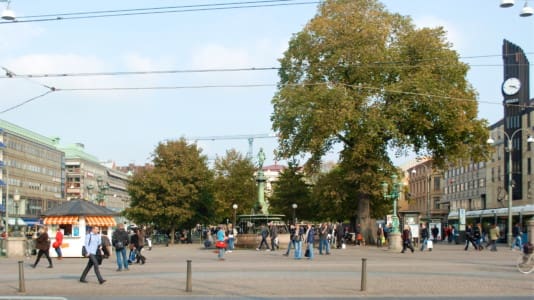Many elderly nursing home residents were left in tears after they were evicted to make room for migrants in Berlin. The case has received widespread media coverage and highlights a growing trend in Germany. Adding to the scandal is that the owners of the building and operators of the nursing home are Christian non-profit institutions that belong to the Berlin Diakonie.
The building, located on Müller Street, was meant to house elderly residents for at least another 10 years. Originally, “Wohnen & Pflege Schillerpark” in the Berlin district of Wedding bought the building to house 141 residents and signed a lease for 25 years. The nursing home was run by the Paul Gerhard Foundation starting in 2006 with an option to extend.
That plan has been terminated early, and instead, the building has shifted to housing refugees. The foundation running the nursing home informed 110 elderly residents they would have to leave, with half already moving out, and the other half slated to leave at the end of 2023.
[pp id=66839]
The residents that have already left the building faced emotional goodbyes as they were forced to pack their belongings.
“During the evictions, tears flowed among those affected. Containers stood in front of the building for days, the furniture was simply thrown away,” said an anonymous relative.
Focus magazine may have broken the story, but the news has also been picked up by German newspapers across the country, including BZ, which quoted a neighbor living nearby, 84-year-old Heinz B., who said, “The first refugees moved in at the beginning of February.”
Focus wrote that it is far more lucrative to house migrants. This may have been a consideration, even for Christian organizations, which have budgets they must carefully watch and staff to pay. According to Focus online and other media sources, operators can earn far more money housing migrants than caring for elderly patients in Germany.
[pp id=67870]
BZ media outlet spoke to the Paul Gerhardt Foundation, which claimed the conversion of the nursing home was not an economic decision. Instead, it stemmed from “the requests of the State Office for Refugees (LAF).” If true, it means the government also played an active role in forcing out the elderly residents to make room for migrants.
In addition, the Paul Gerhardt Foundation wrote that “the decision to change the use was made after the prematurely changed contract.” However, what the foundation does not mention is that both it and the other Christian organization, Johannesstift Diakonie, were the ones that “prematurely” ended the contract themselves. In fact, the Paul Gerhardt Foundation, which is run by a pastor, pressured the other foundation to give up its lease using a specific exceptional clause, which will be addressed later in this article.
Elderly residents did not want to leave
The organization offered to immediately relocate the residents to other locations, but there were few takers since many of them wanted to stay close to their families in the area. The building was equipped for elderly residents, and many of them planned to spend the rest of their life there.
According to Focus, the news that they were being evicted was met with “shock and astonishment” from the residents. The magazine writes that when it comes to nursing homes, residents also pick based on location and proximity to family. Being forced from a nursing home can be a disorienting experience for many people at an advanced age, and nursing home care providers often emphasize that security, continuity, and a stress-free environment are all essential elements in ensuring proper care for seniors.
How were the residents evicted despite a lease?
Focus writes that the news of the eviction first came to light in a statement, which detailed how the Johannisstift Diakonie had terminated the lease for the nursing home. The statement was signed by Pastor Martin von Essen, the head of the Paul Gerhard Foundation, which runs Johannisstift Diakonie. In the statement, residents were informed the lease was ending, but residents were also not made aware that the lease was originally meant to run until 2031.
While glossing over the eviction of the elderly residents, near the end of the statement, the pastor emphasizes “decades of experience” in refugee work. He finally announces that the nursing home will “expand” the “places for multiple traumatized people in need of protection” from the end of 2022/2023.
However, the pastor may have used hardball tactics to force out the seniors. Focus writes that his organization ended the lease early by claiming it would seize the property under a “personal use” clause. This personal use clause, often quite controversial, is regularly used by landlords seeking to evict tenants despite an existing contract. The landlord simply claims he or she, or a family member, needs the property for their own personal accommodation. It is unclear exactly how the Paul Gerhard Foundation would justify “personal use” to end the contract early in this case, but apparently it was enough to force the other organization to agree to break their leases as well.
When asked about using the “personal use” clause, the pastor refused to answer Focus’ questions on the subject, but according to the news outlet, “In church circles (…) it is an open secret that running a refugee home is financially more attractive than running a nursing home.”
This is not the only instance of church organizations evicting seniors to make way for refugees, either. Earlier this month, the story broke that 40 tenants were being evicted from their apartments in Lörrach to make way for refugees. Both cases highlight the enormous pressure on cities and municipalities to accommodate millions of newcomers in recent years. In 2022, 244,132 asylum seekers registered in Germany, in addition to more than a million Ukrainian war refugees. At the same time, both cases highlight skewed financial incentives that exist for operators, which make it more profitable to house migrants than elderly citizens.






